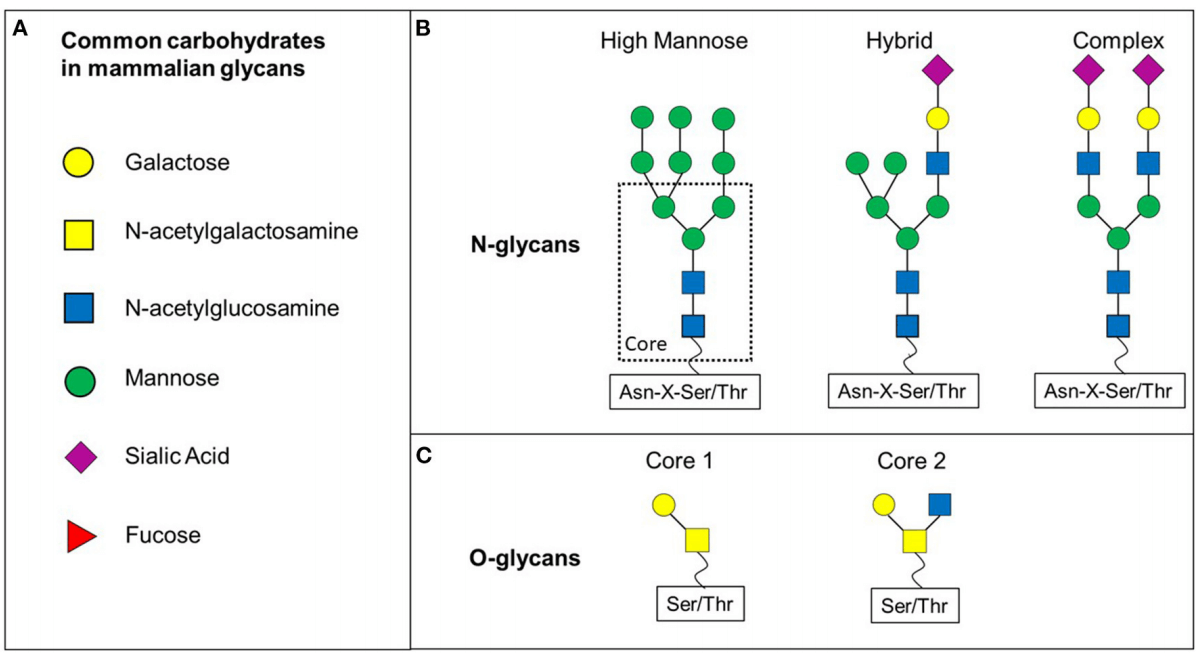Anti-Glycan Antibody for Glycan related Biological Process Modulation
As with other antibodies, anti-glycan antibodies also involve in modulating many biological processes, especially those mediated by glycans. Creative Biolabs is a leading service provider that focuses on antibody products and research, including anti-glycan antibodies. After years of efforts and investigations, we have successfully established universal antibody service platforms to provide fast and professional services for our worldwide customers. This platform, as well as our staff and profound experience, can offer a higher full range of anti-glycan antibodies products and services to help you gain success.
Background of Biological Processes Mediated by Glycans
In humans and other living organisms, carbohydrates, nucleic acids, and proteins are three major bioactive substances and biopolymers that involved in numerous critically physiological functions. As with other macromolecules, carbohydrates, especially glycans, play a key role in many biological processes, as well as some disorders and diseases. Voluminous empirical evidence confirms that glycans mediate diverse biological processes both relatively subtle functions (such as cell-cell adhesion, signaling pathway) and remarkably fatal processes like growth, development, functioning, and survival of human beings. The biological processes mediated by glycans are generally classified into two major categories, the structural and modulatory properties of glycans and the specific recognition of glycans by glycan-binding proteins, which are sensitive and modulated by a large number of molecules, such as enzymes, receptors/ligands, chemicals, antibodies and so forth.
 Fig.1 N- and O-glycan differ in their core structure.1, 2
Fig.1 N- and O-glycan differ in their core structure.1, 2
Anti-Glycan Antibodies Serve as Agonists/Antagonists for Modulating Biological Processes Mediated by Glycans
Anti-glycan antibodies are a class of antibodies directly react with or bind to carbohydrates antigens, which can serve as agonists or antagonists involved in biological processes modulation mediated by glycans. \
The receptor is the key factor in both agonistic and antagonistic effects of anti-glycan antibodies in modulating various biological processes. The agonist activity can occur when the anti-glycan antibody binds the specific receptor site in a way that mimics the natural ligand-binding event, which leads to a conformational change in the receptor and subsequent antibody-mediated downstream signaling or agonism. Such agonistic bindings of anti-glycan antibodies result in many processes, such as the presentation of antigen, production of various interleukins, activation and survival of T lymphocytes, etc. The antagonist activity occurs due to the ligand-binding of anti-glycan antibodies that do not cause a conformational change and no signaling, meanwhile, the active binding is blocked resulted from steric hindrance. The antagonist activities of anti-glycan antibodies mainly utilized in the treatment of some autoimmune diseases that are related to receptor over-activation, as well as the prevention immune rejection of transplantations.
What Creative Biolabs Can Do
The properties of agonism and antagonism can be applied for the production of the therapeutic antibody. With extensive experience in the field of therapeutic antibody development, Creative Biolabs has successfully isolated agonistic and antagonistic antibodies to a panel of receptors. We provide a wide range of services about anti-glycan antibodies about anti-glycan antibodies including Anti-Glycan Antibody Applications, products, and related supports, based on:
- Comprehensive platforms (Therapeutic Antibody Discovery Platform, Phage Display Platform, Hybridoma Platform)
- Custom products and service
- Powerful antibody research technology
- Abundant experience and expertise
To discuss your interest or questions about anti-glycan antibodies, please contact us or send us an inquiry. Our scientists are confident in offering satisfying and the best answers and services.
References:
- Krautter, Franziska, and Asif J. Iqbal. "Glycans and glycan-binding proteins as regulators and potential targets in leukocyte recruitment." Frontiers in cell and developmental biology 9 (2021): 624082.
- Distributed under Open Access license CC BY 4.0, without modification.
